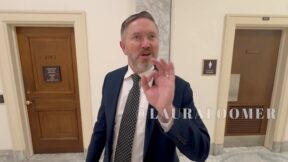Tumbl/CounterTumbl: Peter Feld and John Carney Debate Health Care

John Carney (right) responded to Peter Feld’s post (left), excerpting the paragraph below. To see Feld’s full post, click here.
This takes the cake, but it’s indicative of the distracting, misleading, intentionally irrelevant campaign that health care opponents on the right have been waging. Here’s how it works: Take something completely unrelated to health care, that puts government in a bad light, and say, hey! you hate waiting at the DMV, don’t you? Or the Post Office? Well then, you sure don’t want the government anywhere near your health care! Look at the cops torture that poor kid — well, you sure as heck don’t want these people in charge of your medical treatment!
Peter’s objection to my analogy of one government program with another government program is that they aren’t identical. Well, yes. That’s the difference between analogies and identities.
My point stands: those empowered by the government to make very important decisions that are supposed to protect us too often abuse those powers. Before we create another set of government authorities, we need to think carefully about whether we are confident that we can contain the abuses at some tolerable level.
For every miracle of government Peter cites—the Post Office!—I can cite a travesty. The point isn’t whether the government can ever do anything well. It’s whether we have fully thought out the way to limit the abuse of the powers we are preparing to grant to public authorities.
It’s largely irrelevant what the text of the actual bill says. That’s because government actions are rarely constrained by the letter or the spirit of the law. There are unanticipated consequences, unintended consequences, strange mixtures with other laws. The broader the scope of the reform, the more we have to worry about these things.
Two recent examples. When governments around the world adopted Basel I banking regulations, they never set out to create the credit default swap market, encourage the massive securitization of mortgages or further reify the disastrous monopoly status of the credit ratings agencies. But all three were direct results of the Basel I capital requirements.
Similarly, when Congress passed the TARP, the big debate was between the Administration and Democrats, one the one hand, and GOP dissenters, on the other. The Bush-Pelosi faction favored a program to buy troubled assets. The GOP House members wanted to insure the assets instead. They agreed to a bill that would permit both. Neither ever happened because the Treasury used the TARP to make direct capital injections.
We need to pay attention not to what a law says or claims to do, but the unseen possibilities.
John Carney is Managing Editor of Clusterstock. This piece was originally published at Rise If You Must, his personal website.
Pages: 1 2
This is an opinion piece. The views expressed in this article are those of just the author.





Comments
↓ Scroll down for comments ↓